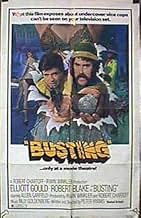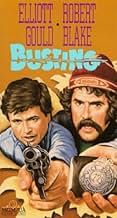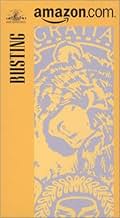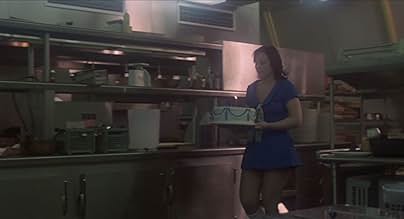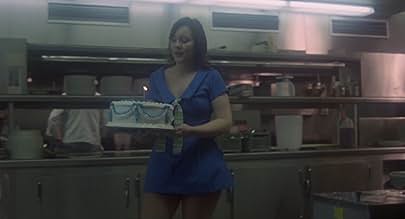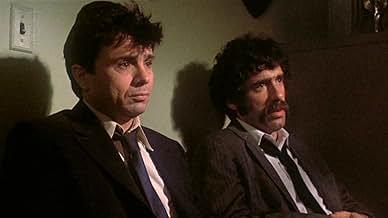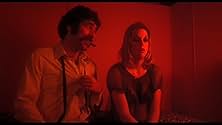IMDb RATING
6.4/10
2.3K
YOUR RATING
Defying orders to lay-off the case, two Los Angeles vice-squad cops go after a local mobster and use unorthodox methods to achieve results.Defying orders to lay-off the case, two Los Angeles vice-squad cops go after a local mobster and use unorthodox methods to achieve results.Defying orders to lay-off the case, two Los Angeles vice-squad cops go after a local mobster and use unorthodox methods to achieve results.
- Director
- Writer
- All cast & crew
- Production, box office & more at IMDbPro
Featured reviews
Talk about a movie that has aged well, despite being over four decades old. There is so much going on, and Elliot Gould and Robert Blake play off each other so well, I didn't even notice, or for that fact care, that they drive 70s "land yachts", and dress "mod". "Busting" is greatly enhanced by our two rogue vice cops constant sarcasm and wise cracking, mostly at Allen Garfield's expense. I would have to say that Gould's performance here easily equals his terrific acting in "The Silent Partner". The film is full of interesting characters, with Michael Lerner as a porno shop owner the standout. As buddy cop movies go, "Busting" is one of the best. - MERK
A Bemused, Self-conscious and Dated Encapsulation of a Now Diluted Genre, and Entertaining Therefore
Busting is a cop show encapsulated, purely episodic in structure as the two vice cop heroes team on various assorted cases, with unstable degrees of success. It's in keeping with the refreshing realism of this period in the film's genre, as it's exceedingly cynical, robustly indicating that crime does pay, and that the biggest criminals in society are dishonest politicians and businessmen who will never be penalized. Were the production not as befuddled and awkward, this rather poorly titled actioner could easily rank among the two French Connections, Bullitt and the Dirty Harry series.
Against an abrasive cityscape of backstreets and littered alleyways, Elliott Gould and Robert Blake star as vagabond vice squad detectives, the type who in actuality set the judicial system back decades. Elliott Gould, the tall one, incessantly chews bubble gum, ambles somewhat hunched and talks in the manner of someone fashioning himself on the star of an Elliott Gould movie, which is awesome. Robert Blake, an unlit cigarette inexplicably hanging from his lips, behaves like a guy who wishes he were tall and realizes he never will be. It doesn't trouble him, though it makes him a bit less compromising than most guys.
Gould and Blake inhabit their work lock, stock and barrel. They consume most of their time apprehending people who are more of a perceived threat to society than a real one: call girls, massage parlor staff and gay bar regulars. It's simply what they do to keep the wheels turning, like road cleaners. It's one of the existential quirks of Busting that when the vice boys do get mixed up in their work, when they find themselves pursuing the Mr. Big accountable for the considerable multi-million-dollar L.A. rackets in addition to the trivial ones, they get thumped, both by the crooks and by their Police Department superiors who may, it would seem, stand for the posture of the society whose protectors they are: The action sooner or later gets around to charging Allen Garfield, cast as a local peer of the realm, with practically all illegal goings-on in town. Garfield, as ever an exceptional actor, brings poise and a sense of being wholly together to the role.
As bemused as the Philip Marlowe Gould interpreted a year before in Altman's brilling Long Goodbye, this 1974 film was the first film by Hyams. His aptitude as a director is more apparent in this film than in any other he's done perhaps, especially in the visual highlights and in the performances. I have an idea that that the qualities of Gould and Blake, instead of the screenplay, are answerable for the distinctness provided the roles. They try a bit too hard for idiosyncrasy and funny habit, nonetheless they're effective at establishing particular characters.
Hyams engineered something of an achievement by crafting a rough cop film sans taking advantage of the right-wing scorn that warns us all to arm ourselves. I.e., it recognizes that when cops and robbers are firing guns at each other in open places, the lookers-on aren't impervious to the bullets. When Gould and Blake chase some heroin pushers through a supermarket in a continuous gunfight, the movie shares the panic of the bystanders to the extent that it does the tension of the pursuit. It's this plane of alertness that secedes this possibly pioneering buddy cop picture from the subsequent second-hand goods in marketeering mockery of the genre that was given that healthy dose of gritty reality in the 1970s, not only by transcendent pictures like The French Connection and classics like Dirty Harry, but even bargains like Busting.
Against an abrasive cityscape of backstreets and littered alleyways, Elliott Gould and Robert Blake star as vagabond vice squad detectives, the type who in actuality set the judicial system back decades. Elliott Gould, the tall one, incessantly chews bubble gum, ambles somewhat hunched and talks in the manner of someone fashioning himself on the star of an Elliott Gould movie, which is awesome. Robert Blake, an unlit cigarette inexplicably hanging from his lips, behaves like a guy who wishes he were tall and realizes he never will be. It doesn't trouble him, though it makes him a bit less compromising than most guys.
Gould and Blake inhabit their work lock, stock and barrel. They consume most of their time apprehending people who are more of a perceived threat to society than a real one: call girls, massage parlor staff and gay bar regulars. It's simply what they do to keep the wheels turning, like road cleaners. It's one of the existential quirks of Busting that when the vice boys do get mixed up in their work, when they find themselves pursuing the Mr. Big accountable for the considerable multi-million-dollar L.A. rackets in addition to the trivial ones, they get thumped, both by the crooks and by their Police Department superiors who may, it would seem, stand for the posture of the society whose protectors they are: The action sooner or later gets around to charging Allen Garfield, cast as a local peer of the realm, with practically all illegal goings-on in town. Garfield, as ever an exceptional actor, brings poise and a sense of being wholly together to the role.
As bemused as the Philip Marlowe Gould interpreted a year before in Altman's brilling Long Goodbye, this 1974 film was the first film by Hyams. His aptitude as a director is more apparent in this film than in any other he's done perhaps, especially in the visual highlights and in the performances. I have an idea that that the qualities of Gould and Blake, instead of the screenplay, are answerable for the distinctness provided the roles. They try a bit too hard for idiosyncrasy and funny habit, nonetheless they're effective at establishing particular characters.
Hyams engineered something of an achievement by crafting a rough cop film sans taking advantage of the right-wing scorn that warns us all to arm ourselves. I.e., it recognizes that when cops and robbers are firing guns at each other in open places, the lookers-on aren't impervious to the bullets. When Gould and Blake chase some heroin pushers through a supermarket in a continuous gunfight, the movie shares the panic of the bystanders to the extent that it does the tension of the pursuit. It's this plane of alertness that secedes this possibly pioneering buddy cop picture from the subsequent second-hand goods in marketeering mockery of the genre that was given that healthy dose of gritty reality in the 1970s, not only by transcendent pictures like The French Connection and classics like Dirty Harry, but even bargains like Busting.
I caught part of this 1973 flick one late night on TNT. I was intrigued because it was supposed to be Peter Hyams' first theatrical effort. So I went out and bought a copy on VHS. At first this film may not seem much. Just an updated version of the old police procedurals from the 1940s and 50s. But after a couple more viewings I was hooked. There's a certain indescribable quality to it (see Walter Hill's "The Driver" and you'll know what I mean). A hang-dog, left coast version of the French Connection. Very laid back, but deadly serious. The viewer feels the same frustrations the Gould-Blake teams feels in the up-hill struggle to rid their beat of society's scum. The duo risks life, limb, and personal and professional humiliation trying to nail the vile crime boss and galvanize indifferent peers and supervisors. Brisk dialogue, thoughtful direction, excellent photography by Earl Rath, sleazy LA locales and a fine cast make this forgotten film a winner. Give it a try!
I first saw this in the mid '80s and thought: 'what a stylish thriller!' It seems to have been filmed in a low-grade film stock, which has given it a grainy/soft-focus look which also adds to it's realism. Elliot Gould, who stars as one of the hard-bitten cops also appears in another Peter Hyams opus, Capricorn One. Robert Blake who plays Gould's partner, later featured in his own TV detective series called Baretta.
There are some wonderful set-pieces in the movie, the best in my opinion involving our heroes chasing some bad dudes from a seedy hotel, and through a supermarket on the streets. It's classic Cat-and-Mouse fare, as the villains take a hostage while Gould 'n' Blake have them firmly in their gunsights. This moment is ingeniously realised by Hyams' use of a wide-angled lens. There are also brilliant car chases galore to marvel at.
Anyone who is a fan of this type of gritty cop thriller with a downbeat ending, would enjoy another good example: William Friedkin's 'To Live and Die in LA' (1985) which stars C.S.I.'s William Peterson.
There are some wonderful set-pieces in the movie, the best in my opinion involving our heroes chasing some bad dudes from a seedy hotel, and through a supermarket on the streets. It's classic Cat-and-Mouse fare, as the villains take a hostage while Gould 'n' Blake have them firmly in their gunsights. This moment is ingeniously realised by Hyams' use of a wide-angled lens. There are also brilliant car chases galore to marvel at.
Anyone who is a fan of this type of gritty cop thriller with a downbeat ending, would enjoy another good example: William Friedkin's 'To Live and Die in LA' (1985) which stars C.S.I.'s William Peterson.
Directed by Peter Hyams, Busting apparently inspired the television show Starsky & Hutch. It was released at a similar time as Freebie and the Bean which was commercially more successful but Busting is more tighter, coherent and cynical picture that still retains elements of its comedy.
Keneely (Elliott Gould) tall, laconic and chews gum all the time and Farrel (Robert Blake) shorter and tougher are two LA vice cops who spend most of their time arresting hookers and people in gay bars rather than than the big crime lords who they feel are being protected by their superior officers and cynical lawyers.
They decide to go all out to catch the local crime lord Rizzo (Allen Garfield) which annoys their superiors who prefer they go after the small fry.
The film has a comedic and anarchic tone but beneath the cynicism it also has a heart of two cops trying to do the right thing and not happy with just fitting up hookers and their clients.
There are thrills as well with well staged shootout sequences in a market and later in a hospital. The film is a softer and sarcastic edged version of The French Connection featuring elements of a buddy cop duo and a message that crime does pay.
Keneely (Elliott Gould) tall, laconic and chews gum all the time and Farrel (Robert Blake) shorter and tougher are two LA vice cops who spend most of their time arresting hookers and people in gay bars rather than than the big crime lords who they feel are being protected by their superior officers and cynical lawyers.
They decide to go all out to catch the local crime lord Rizzo (Allen Garfield) which annoys their superiors who prefer they go after the small fry.
The film has a comedic and anarchic tone but beneath the cynicism it also has a heart of two cops trying to do the right thing and not happy with just fitting up hookers and their clients.
There are thrills as well with well staged shootout sequences in a market and later in a hospital. The film is a softer and sarcastic edged version of The French Connection featuring elements of a buddy cop duo and a message that crime does pay.
Did you know
- TriviaIn the courtroom scene of Jackie the hooker's preliminary hearing, the Judge's name on his desk nameplate is "Hon. Fred R. Simpson" . This is also the name of the film's First Assistant Director.
- GoofsNear the end of the movie, during the ambulance chase, there are already skid marks on the road surface at the school crossing. These appear to be from previous takes on the scene as they match the ambulance's path perfectly.
- Quotes
Vice Detective Michael Keneely: Wouldn't you think the man would've at least had the decency to stay for the sermon?
Vice Detective Patrick Farrel: The Lord's gonna smoke his ass!
- Alternate versionsThere is a circulating TV print that deletes most of the R-rated content and adds superfluous scenes involving Rizzo's drug-courier (the white man in the grocery store shoot-out).
- ConnectionsFeatured in Trailer Trauma V: 70s Action Attack! (2020)
- How long is Busting?Powered by Alexa
Details
Box office
- Gross US & Canada
- $111,000
Contribute to this page
Suggest an edit or add missing content


